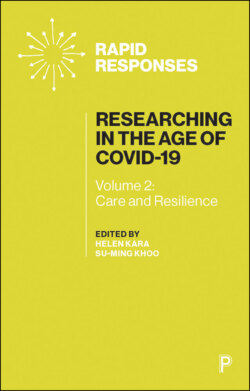Researching in the Age of COVID-19 Vol 2

Реклама. ООО «ЛитРес», ИНН: 7719571260.
Оглавление
Группа авторов. Researching in the Age of COVID-19 Vol 2
Researching in the Age of COVID-19. Volume 2: Care and Resilience
Contents
List of figures and tables
Notes on contributors
Introduction
References
1 Do the best you can: researcher safety in a pandemic
Your wellbeing
BC (Before COVID-19)
Areas of risk for researchers and possible responses1
The impact of the pandemic on researcher safety
Positives in a pandemic
Where next?
References
2 “I don’t know what I’d have done without this project”: Oral history as a social and therapeutic intervention during COVID-19
Crisis in the past
Crisis in the present
Listening through crisis
Insights from COVID-19
References
Acknowledgements
3 Diversity, equity and inclusion research in public health and the health professions education during a pandemic and societal anti-racism protests
Public health education during the pandemic
The educational community
Research in a time of crisis
Priorities for research in times of crisis. Focus on providing opportunity and value
Be adaptable and flexible
Build community
Reflect on the times and ethical considerations
Conclusion
References
Acknowledgements
4 Methodological and ethical considerations in the study on children’s everyday lives under COVID-19 in three African countries: Ghana, Nigeria and South Africa
Introduction
Experiences from Ghana, Nigeria and South Africa: methods, sampling and procedures
Sample population
Procedures. Access to study participants
Seeking consent for participation
Recording children’s experiences
Ethical considerations in the study
Challenges
Methodological reflections
Conclusion
Note
References
5 Exploring young people’s experiences of growing-up under COVID-19
Introduction
The research approach
Recruitment process
Providing support and getting going
Emerging themes and reflections on conducting research during a pandemic
Note
References
6 Ensuring no voices are left behind: the use of digital storytelling and diary writing in times of crisis
Introduction
Background: virtual methods and young people
Methodology: GAGE virtual research with vulnerable adolescents
Findings: strengths and challenges of virtual qualitative research
Diary writing
Digital storytelling
Concluding remarks
References
7 Using ICT to research maternal, newborn and child health during the COVID-19 pandemic in Nigeria
Introduction
Considerations for a mixed-methods study
Conceptual framework: the three delays model
Quantitative design aspects
Qualitative design aspects
Operationalizing the data-collection strategy
Ethical considerations
Challenges and possible mitigation strategies
Conclusion
References
8 Piling on the pressure? Negotiating burden/benefit dynamics in social research during times of crisis
Introduction
Challenged contexts
Critical considerations for research during crises
Conclusion
References
9 Keep Talking: messy research in times of lockdown
Introduction
Keep Talking
Impacts of COVID-19
Benefits of deprioritizing research and prioritizing wellbeing
Conclusion
References
Acknowledgements
10 Occupational being during the COVID-19 pandemic
Managing uncertainty
Engaging with new ethics requirements
Navigating limitations and barriers
Early findings
The lessons of doing research during a pandemic
References
11 Prioritizing inclusion, ethical practice and accessibility during a global pandemic: the role of the researcher in mindful decision making
Introduction
Ethics and care
Inclusivity
Mindful decision making
Conclusion
References
Conclusion
References
Отрывок из книги
Edited by
Helen Kara and Su-ming Khoo
.....
Boynton, P . (2020a) Being Well in Academia: Ways to Feel Stronger, Safer and More Connected (1st edn), Abingdon: Routledge.
Boynton, P. (2020b) Wellbeing in the pandemic: Building a recovery syllabus for staff and students. Available at: https://theresearchcompanion.com/recoverysyllabus/ [accessed 27 August 2020].
.....